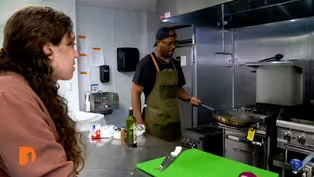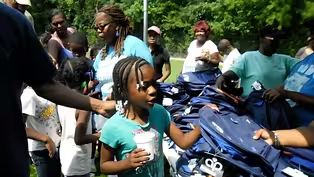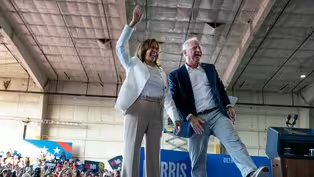
Forgotten Harvest’s new CEO talks about demand for services
Clip: Season 9 Episode 6 | 4m 56sVideo has Closed Captions
Forgotten Harvest CEO Adrian Lewis talks about the increased demand for agency’s services.
Forgotten Harvest has appointed Adrian Lewis as the new CEO of the food rescue organization. Host Stephen Henderson talks with Lewis about the increased demand for Forgotten Harvest’s services. Plus, Lewis highlights the agency’s summer feeding program for youth, its new facility, and its client choice market.
Problems playing video? | Closed Captioning Feedback
Problems playing video? | Closed Captioning Feedback
One Detroit is a local public television program presented by Detroit PBS

Forgotten Harvest’s new CEO talks about demand for services
Clip: Season 9 Episode 6 | 4m 56sVideo has Closed Captions
Forgotten Harvest has appointed Adrian Lewis as the new CEO of the food rescue organization. Host Stephen Henderson talks with Lewis about the increased demand for Forgotten Harvest’s services. Plus, Lewis highlights the agency’s summer feeding program for youth, its new facility, and its client choice market.
Problems playing video? | Closed Captioning Feedback
How to Watch One Detroit
One Detroit is available to stream on pbs.org and the free PBS App, available on iPhone, Apple TV, Android TV, Android smartphones, Amazon Fire TV, Amazon Fire Tablet, Roku, Samsung Smart TV, and Vizio.
Providing Support for PBS.org
Learn Moreabout PBS online sponsorship- Let's talk about the things that you're confronting as you take over there at Forgotten Harvest.
We want to talk more specifically about summer and how different that is, but give us an overall picture of the organization and the challenges.
- Absolutely.
Well, Forgotten Harvest, over the almost 35 years of its existence, it's always been about closing that gap on food insecurity and hunger throughout Metro Detroit.
That has not changed.
And as we begin to now better leverage our new facility, we are truly doing that, Stephen.
And that's really fortunate in a sense that we're able to do it because we're seeing a 30% increase in demand for our services.
So being able to do that, it's definitely a plus.
But obviously we wanna make sure that we're being very specific and concise on where we're addressing that need.
- Yeah, let's talk about that new facility.
That's been a long time coming.
What's the advantage to the organization of having that facility and how much better that makes the services that that you provide?
- Absolutely.
You know, the facility itself is about 78,000, I'll call it 80,000 square feet.
And to be able to not only have the extra capacity to hold food goods, but we're now able to really be creative in how we distribute it, especially from an equitable perspective, making sure that we're getting things sorted so that we can reach all of our 260 distribution sites in a timely manner.
- All right, so let's talk about summer and what summer means for hunger in this community, and therefore what it means for Forgotten Harvest.
Things look a little different than they do other parts of the year.
- Yeah.
You know, if we look at the vulnerable populations of our children as well as, I've seen this, right?
If we look at just those two, and there's probably a few others I could easily name, but summer feeding has definitely been a focus.
You know, we have at over 10 sites that we're doing summer feeding at.
But being able to definitely keep the youth nourished as well as involved during the summer months.
But also for our seniors.
We're partnering with Amazon, DoorDash to be able to do deliveries throughout the summer.
Many of our seniors aren't able to get out, as you would imagine.
So we're identifying those individuals that we can help and assist.
And it's all about choice, right?
I mean, many of our distributions are a matter of, you know, you'll see those already predetermined amounts that we're giving to our neighbors in need.
But we are now working on our client choice market in which we will have the ability to have our neighbors to come in and shop just like a grocery store and which it's not a new concept, but it is new and exciting for us to be able to roll out into the community.
- I also wonder what you're seeing in terms of the need in our community and whether it is more acute right now because of some of the things that we're dealing with in the general economy, or in fact whether maybe they're not as acute.
I mean, we keep hearing stats about the falling numbers of children in poverty because of things like the federal tax credit and some other measures.
But I wonder what that looks like from you as a provider.
- Yeah, it definitely, what we're seeing it definitely aligns with the high inflation of food, right?
It definitely aligns with that.
It definitely shifted as the tax credits were exhausted, so to speak.
So that definitely aligned.
But you know what was really interesting post-pandemic, as I would say, is that many of our family, of our neighbors in need, or neighbors in general, were just made more aware of that dignity of respect that we're providing as a service, that they're not ashamed to share.
That they're sharing more about the awareness with other neighbors.
So I believe that also has an uptick in the use of our services that may or may not have been there in the past.
- Yeah.
Yeah.
The 2024 Collard Greens Cook-off Championship in Detroit
Video has Closed Captions
Clip: S9 Ep6 | 6m 51s | Collard Greens Cook-off Championship returns with new flavors and expanded competition. (6m 51s)
One Detroit Weekend: August 9, 2024
Video has Closed Captions
Clip: S9 Ep6 | 1m 56s | One Detroit contributor Dave Wagner of 90.9 WRCJ shares events coming up this weekend. (1m 56s)
OPINION | Michigan’s primary and Kamala Harris’ running mate
Video has Closed Captions
Clip: S9 Ep6 | 8m 6s | One Detroit contributors discuss Michigan’s primary results & Kamala Harris’ running mate. (8m 6s)
Providing Support for PBS.org
Learn Moreabout PBS online sponsorship
- News and Public Affairs

Top journalists deliver compelling original analysis of the hour's headlines.

- News and Public Affairs

FRONTLINE is investigative journalism that questions, explains and changes our world.












Support for PBS provided by:
One Detroit is a local public television program presented by Detroit PBS


